25 Etiquette Rules That Have Changed in Your Lifetime
Etiquette experts say these old-fashioned manners are no longer worth practicing.
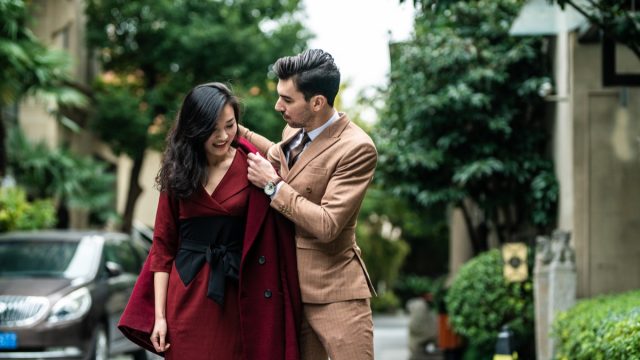
It's something we've all heard, said, or experienced in one way or another over the years—someone from an older generation expressing their disapproval of how those in younger generations behave, often in regards to their lack of manners, common courtesy, or proper etiquette. However, the reality isn't so much that younger people don't have manners or codes of etiquette anymore, it's more that they just have ones that are different from the ones the generations before them had. What was deemed "polite" a couple of decades ago may have been naturally phased out of practice, or may even be seen as rude nowadays. So, to clear the air a bit, we've rounded up all the etiquette rules that have changed in your lifetime, according to experts.
1
You no longer need to address adults using a title and their last name.

Back in the day, the polite thing to do was to call everyone by a title—Mr., Mrs., Ms., etc.—and their last name. And this wasn't just for children speaking to their elders, either. Adults were expected to greet other adults in this way. However Lynell Ross, behavior change specialist and founder of Zivadream, says this isn't the norm anymore.
"In the United States, at least, we may call coworkers or new people we meet by their first names," she says. "Also, if an adult tells a child that it is alright for them to call them by their first name, this is acceptable as well. Letting go of these stiff old rules makes for better, less formal relationships."
2
You no longer have to return a casserole dish with more food.
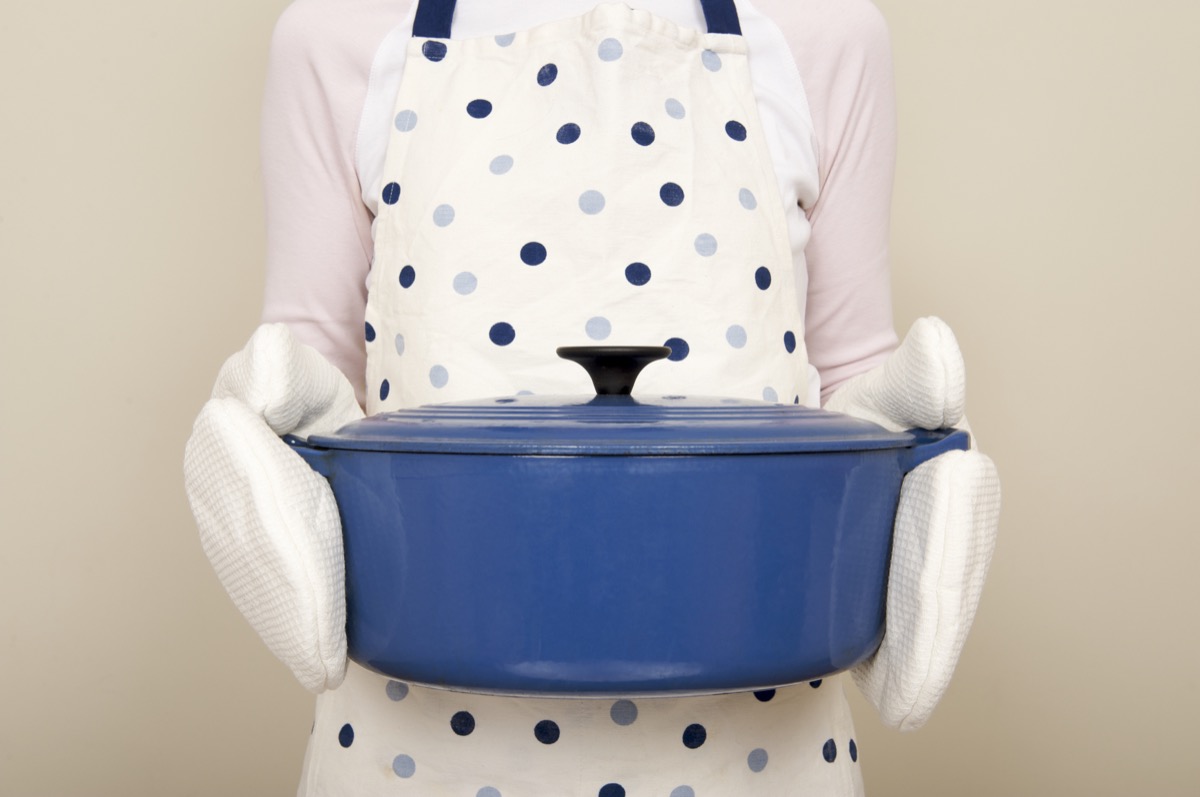
It used to be customary for people to bring baked dishes, like a casserole, to your home during a hectic or hard time, such as a death in the family, a new baby, or even an illness. And while people still do this, the expectation that you have to return their dish back to them with a new home-cooked meal in it has changed. Ross says, because she grew up in a time when this was common, she always feels "guilty about returning an empty dish" when a friend makes her a casserole. But these days a simple thank you note is an acceptable substitute.
3
You can't just randomly call anyone anymore.

When you picked up the phone and randomly called someone, it used to be seen as kind and caring. However, with the simplicity of texting and emailing, it's now seen as rude and intrusive to call someone and expect them to drop everything to listen to you speak. In an article in The New York Times called "Don't Call Me, I Won't Call You," it's noted that "phone calls from anyone other than immediate family tend to signal bad news" because most people simply send a text. Calls are reserved for long and serious conversations.
4
Men don't always have to make the first move.

It wasn't that long ago when the idea of a woman asking a man out on a date was not considered to be a socially acceptable practice. A woman had to wait for a man to "choose" her. However, as certified dating coach Jonathan Bennett previously pointed out to Best Life, that's no longer the case. While some women still prefer the old-fashioned nature of a man making the first move, there are plenty of women who take "charge of their relationship choices." Take popular dating app Bumble, for example, which requires women to make the first move.
5
Men aren't always required to pick up the check.
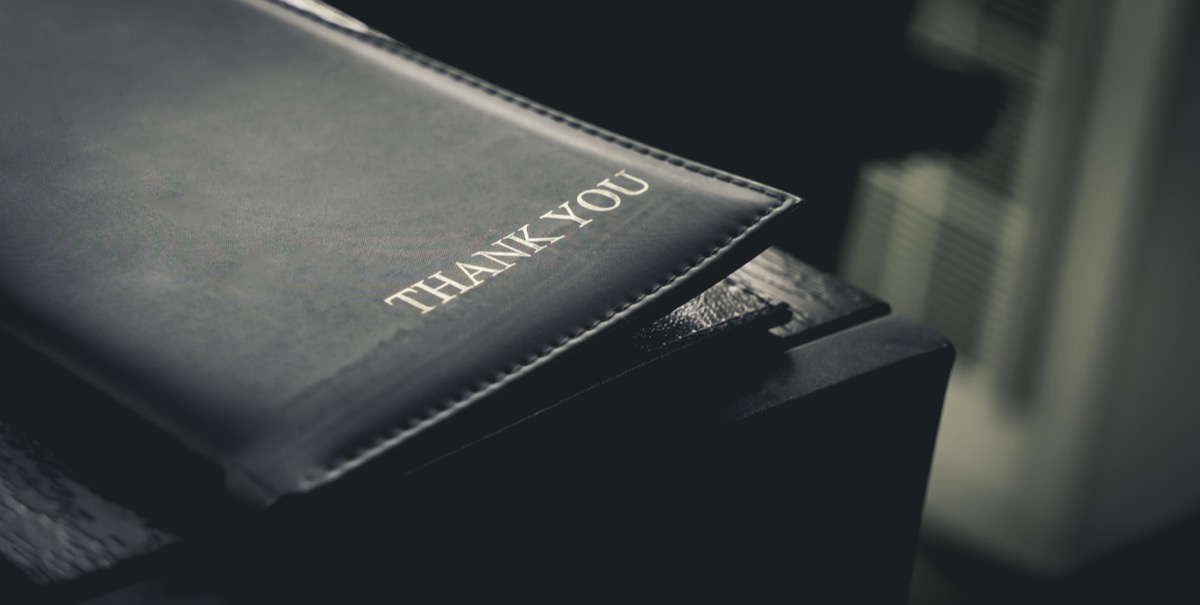
Another old-fashioned dating etiquette rule that is slowly, but surely, phasing out is the idea that a man always has to pay for the meal when on a date. In a 2013 survey of more than 2,000 men and women, Forbes reported that while 71 percent of the Lost Generation (ages 67–82) felt that a man should always pay, only 50 percent of Generation Z (ages 18–23) felt the same way—and that number is only expected to keep falling moving forward. The new popular concept is that the person who asked for the date should offer to pick up the check, with 42 percent of all respondents feeling this way.
6
Kissing someone's hand is no longer seen as polite.

If you watch a movie set in any time before the 21st century, you will often see men greeting a woman by kissing her on the hand. But in everyday scenarios, you no longer see this taking place. Instead of being seen as polite, this is more often seen now as pretentious and at times, creepy. When a Reddit thread asked if hand-kissing was still a common form of greeting etiquette, responses overwhelmingly fell in the "no" category—with people responding, "Do you live in a '90s soap opera?" and "It's almost always cringeworthy and awkward."
7
You no longer have to switch conversation partners at dinner.

This etiquette rule was common decades ago, but someone born in recent years might not even realize it was ever a rule with how unused it is nowadays. In her Manner Monday column, etiquette expert Carey Sue Vega writes that women used to have to turn their conversation to the person on the other side of them whenever they saw their hostess do the same. This way, everyone had a talking partner during the meal.
In his 2008 book Eat Where You Live, Lou Bendrick also notes that people used to switch conversation partners after each course. Nowadays, you'll usually find people all over the table engaging in various conversations, typically with the people they're most familiar with.
8
You don't have to overdress at work to be taken seriously.

Many offices still have a dress code policy in their employee handbooks, but the days of needing to wear a suit or dress to work are far behind us. Elizabeth Pearson, an executive career coach, says that over the last 10 to 15 years, more companies have embraced a "business casual dress code," with some even going as far as to "encourage employees to wear jeans and t-shirts." It may still not be acceptable to throw on a crop top and yoga pants when going into the office, but dress policies have "significantly relaxed" in most office cultures, Pearson says.
9
Women are no longer expected to take their husband's last name.
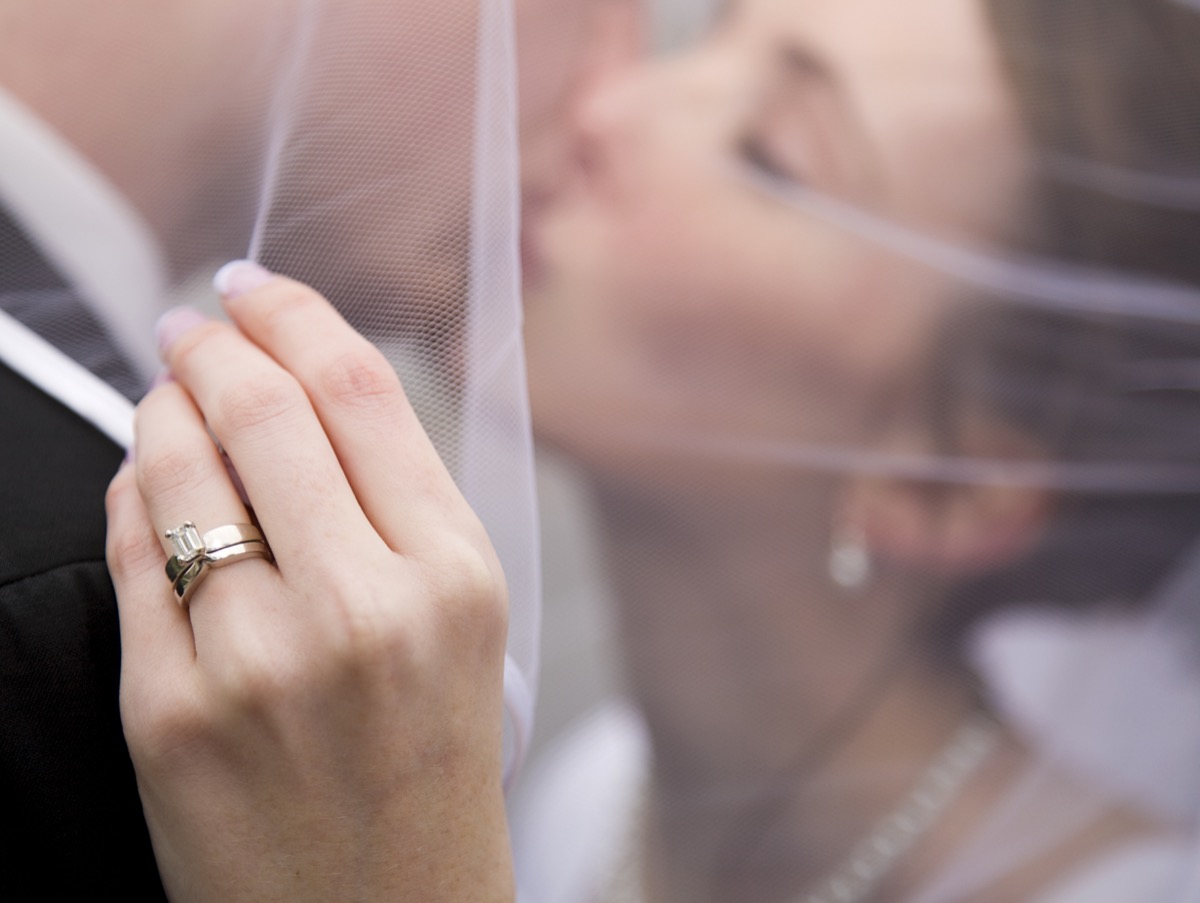
In the past, women didn't really have a choice on whether or not they adopted their husband's last name when they got married. However, as the years go by, it's become more and more common for women to ignore this once steadfast societal rule. As women are more prominent in the workplace, the years they have spent building reputations around their maiden names make it harder to detach from them, says Pearson. Not to mention, it's quite a lot of work to change your name.
"For anyone who's had to go through the hassles of legally changing their name, you're well aware that it's a pain, to say the least," she says. "It requires a visit to the dreaded DMV, the passport office, as well as changing over all of your credit cards, bank accounts, email lists, magazine subscriptions, and even social media profiles." All that work may be why more millennial women are forgoing the custom of taking their husband's surname, Pearson says.
10
You don't have to worry about wearing white after Labor Day anymore.

You probably still hear people say "you can't wear white after Labor Day," but despite the fact that this was once an accepted rule of fashion, it's not often followed anymore. In the past, this rule existed because those in higher society would wear white during the summer months to stay cool, but after Labor Day, the color was no longer a practical option for daily tasks, so the wealthy would switch out white linens for darker clothes to indicate that summer was over, and it was time to get back to work.
Maryanne Parker, etiquette expert and founder of Manor of Manners, tells people not to worry about the color of their clothes anymore. Instead, just be "careful with the fabrics," as lighter fabrics should be reserved for the summer, and heavier fabrics should help you transition into the cooler months.
11
And you no longer have to wear white on your wedding day.
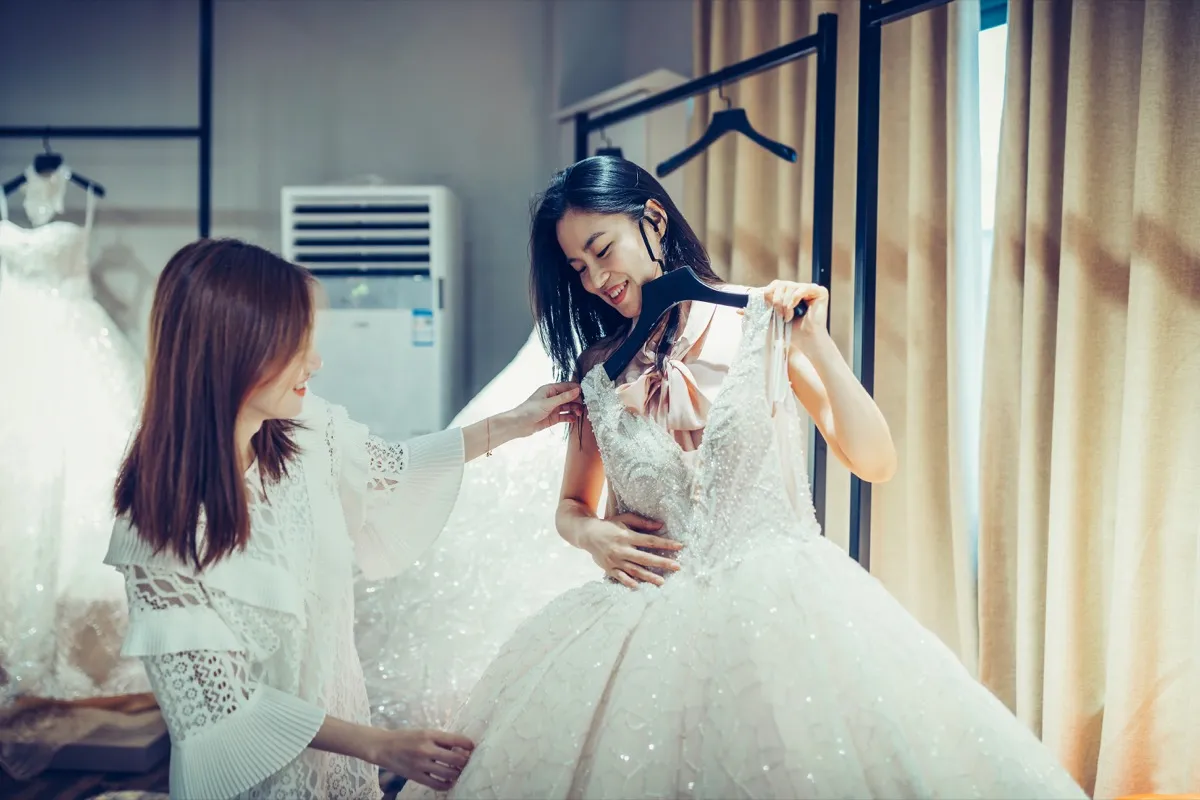
Queen Victoria set a precedent that women must wear white on their wedding day, and it's been commonplace for women to do so over the past decades—as it embraced a symbol of "purity and innocence." However, this tradition is no longer a must. Many brides are opting out of the white tradition and going with different color dresses for their wedding.
"The idea of 'giving away' the bride or having me wear white seemed archaic and off-putting," one bride told Elite Daily. Instead, she said that her wedding was "big and bright," not white.
12
You aren't required to ask someone to be in your wedding party just because you were in theirs.

Dress hues aside, there is so much in the world of wedding etiquette that has changed over the years. And Kathryn Money, vice president of strategy for wedding company Brilliant Earth, says there are a lot of gray areas when it comes to modern wedding etiquette. In a survey for the company, Money said one of the most shocking changes in etiquette is that people no longer feel obligated to include someone in their wedding party. The survey revealed that 54 percent of people believed there were "no rules when it comes to selecting a wedding party," even if they were in that person's wedding party previously.
13
The bride's family is no longer required to foot the wedding bill.

It also used to be set in stone that a bride's family would pay for the wedding. However, many people are getting married much later in their life nowadays, according to the U.S. Census Bureau. And because of this, Parker says the idea that a bride's family pays for the wedding is no longer a set rule. Many couples today are financially independent by the time they consider marriage and earn more money than their parents, so they end up paying for their wedding as a joint endeavor.
14
Women no longer have to place a hand on their lap during dinner.

Back in the day, it was common courtesy for a woman to place one of her hands on her lap during dinner. Parker says this signified that the woman was "elegant, feminine, and polite," which was how they were expected to present themselves at the dinner table. However, over the years, the gesture garnered a "submissive undertone," which women have pushed back against and helped drive the rule out of practice.
15
You no longer have to follow a formal funeral dress code.

Some people still wear formal black attire to a funeral to indicate that they're in a period of mourning, but it's no longer a strict etiquette rule. Parker says that people are mostly "appreciated just for coming to say their last goodbyes" and aren't judged for how they show up to a funeral because they are typically taking time away from work or other responsibilities to be there. The only place you'll see this hard and steadfast rule anymore is within the royal family, who reportedly are always required to have a black formal outfit packed in their luggage when traveling abroad in case of a sudden death in the family.
16
Hosts no longer have to avoid asking personal questions about their guests.

When hosting a dinner party, it used to be seen as taboo or rude for a host or hostess to ask personal questions about their guests, even when it came to things like allergies, dietary restrictions, and religion. However, Parker says this is actually the opposite of what takes place nowadays. With so many people having different dietary restrictions, food allergies, and religious beliefs, it would almost be considered rude for a host not to ask theirs guests about such matters.
17
Women no longer need to be served first at a restaurant.

While you may still encounter the occasional server who follows a "ladies first" rule to be polite, this concept is no longer required in restaurants. According to Eater, many upscale restaurants had a classic service standard where women were served first, going clockwise around the table, then men were served after, also in clockwise order. This included ordering, pouring water, serving plates, and taking away empty plates. However, more restaurants are getting rid of their "ladies first" rules and simply serving by seat numbers, regardless of gender.
18
You don't have to worry about whether or not your elbows are on the table.

When dinner tables used to be intricately decorated and furnished, it made sense that you should avoid setting your elbows on the table. After all, one wrong move and you could accidentally take the whole table display down. However as etiquette expert Maralee McKee explained on her site, Manners Mentor, this rule has wavered over the years. She writes that the "more we lean towards people while they're speaking, the more it's evident to them that we're interested in what they're saying." If you're sitting at a table, this means your elbows will most likely be on top of it—and it's not seen as rude.
19
You don't have to wait for the whole table to be served before you eat.

As etiquette expert Diane Gottsman explained to Vogue, some people still think it's important to wait for everyone to be served before they eat. However, any "gracious guest" who realizes that everyone else's food is getting cold should, and will, not want to hold up the table. Simply offering a "please eat," to the other guests around the table is more encouraged these days than forcing everyone to wait while their food gets cold.
20
You don't have to have alcohol to participate in a toast.

Due to an old superstition dating back to Ancient Greece, it used to be a common etiquette rule that those not drinking alcohol had to refrain from raising their glasses in a toast. However, many people abstain from drinking alcohol, and it's become more rude to exclude the people who aren't drinking. According to Mary Mitchell's "Modern Etiquette: Guidelines for Giving Toasts," you should raise your glass for toast, even if you are not drinking alcohol. She says "anything will do," even water. It is simply "the thought that counts."
21
You don't have to wait for a woman to extend her hand before offering yours to shake.

In old office culture, it used to be commonplace for men to wait to shake a woman's hand until after she extended hers. They couldn't lead with their own hand extended. However Bonnie Tsai, founder of Beyond Etiquette, previously told Best Life that this rule has become outdated.
"The general rule is the host of the higher-ranking individual should extend their hand out to welcome the other party," she says. "However, if the host or senior-ranking individual doesn't extend their hand immediately after you meet, the other party should extend theirs."
22
You can share your personal information with whomever you want.

It used to be "completely unacceptable" to share your personal information back in the days, says Parker. However, with social media so commonplace in society now, sharing personal information has almost become the norm, rather than taboo.
"As a matter of fact, if we don't, we might be left out, especially in business," she says. "I do plenty of speaking engagements and most of the entrepreneurs share vulnerable, heartwarming, or heartbreaking details because it is a very powerful skill to connect with the audience. Vulnerability is praised."
23
And you're free to talk to strangers, too.

The rise of the internet and social media has also changed the way we view speaking to strangers. It used to be seen as rude, or dangerous, to strike up a conversation with someone you did not know. However, Parker says this is now how most of us communicate with people, whether it's meeting them "over social media" or in your day-to-day activities.
24
You can bring up serious topics during group conversations.

During small talk or family conversations, some topics used to be seen as taboo, or even rude, to bring up, like politics, religion, or anything else deemed even remotely controversial. However, Parker says the culture is changing and "talking about the weather" can only take conversations so far. People feel more comfortable discussing a more diverse and dynamic range of topics, instead of keeping conversations limited to "outdated small talk."
25
You don't need to address a letter to a "sir" or "madam" anymore.

In fact, you probably shouldn't. With gender norms changing, it's rude to make presumptions about how a person identifies themself when it comes gender. When addressing a letter or email to someone you're not closely associated with or unsure how to greet, people used to write "Dear Sir," or "Dear Madam," as a default greeting. Grammarly cautions people to avoid this formal greeting and instead consider alternatives, like addressing a stranger through their supposed job title, like "Dear HR Operations Manager," or simply using the common "To Whom It May Concern" approach.





















